Overview
So, what’s the scoop? This article dives into the essential brand safety requirements that should definitely be part of influencer contracts. It highlights why clear guidelines are crucial—think compliance with FTC regulations, content deliverables, exclusivity clauses, and transparency in disclosures. These elements are key to maintaining brand integrity and building trust in those influencer marketing partnerships. Let’s explore how these factors can really make a difference!
Introduction
In today's fast-paced digital world, the blend of influencer marketing and brand safety is more crucial than ever. As brands turn to social media personalities to showcase their products, grasping the key elements of influencer contracts is essential. This article explores nine important brand safety requirements that not only shield a company's reputation but also build trust and transparency in influencer collaborations.
So, with all the compliance complexities out there, how can agencies ensure their contracts protect both sides while boosting the chances for successful partnerships?
Creator Check: AI-Powered Management for Influencer Contracts
Creator Check is here to shake up contract management for content creators with some seriously advanced AI technology. Imagine an AI-powered inbox that not only streamlines your communication but also automatically tags and prioritizes your emails. This means agencies can rest easy knowing they won’t miss any critical messages. Pretty neat, right?
And let’s talk about the Brand Manual feature. It’s all about keeping your messaging consistent across campaigns, which really helps in strengthening your identity and building trust with your audience. This level of automation is a game changer—it saves you valuable time and supercharges the negotiation process. With the AI negotiator on your side, you could save hours of manual work each week, allowing agencies to land more lucrative deals for their creators.
Now, here’s the kicker: all of this comes with a subscription fee of just $25 a month per inbox. Creator Check brings all these essential tasks together, enabling agencies to concentrate on strategic growth while ensuring compliance with brand safety requirements in influencer contracts. In the end, this leads to better results, like securing higher-paying contracts and boosting operational efficiency in the bustling influencer marketing space. So, what are you waiting for? Let’s take your agency to the next level!
FTC Guidelines: Essential Compliance for Influencer Contracts
Did you know that the Federal Trade Commission (FTC) requires social media personalities to disclose any material connections with brands, like payments or free products? It’s true! Contracts should clearly outline the brand safety requirements in influencer contracts to ensure everything remains above board. If someone doesn’t follow these guidelines, they could face some hefty penalties—think civil fines that can hit up to $50,120 for each violation. The FTC has been pretty active in enforcing these rules lately, especially with the updated Endorsement Guidelines from 2023 that clarify what needs to be disclosed on various platforms. For example, back in 2022, Fashion Nova got slapped with a $4.2 million lawsuit for hiding negative user reviews, which really shows how serious the consequences can be for not following FTC regulations. Plus, there’s that ongoing lawsuit involving Google and iHeartMedia over deceptive endorsements, which is another reminder of what can happen if you don’t comply.
Agencies have a big role to play in helping their advocates understand these regulations. By including clear disclosure clauses in contracts, they not only promote transparency but also adhere to brand safety requirements in influencer contracts, thereby building trust with content creators and their audiences. Experts agree that keeping things authentic is key; as Richard Hanna points out, influencers need to be upfront about when they’re being compensated, which can affect how genuine they seem to their followers. And it’s not just about the influencers—brands need to keep an eye on what social media personalities are posting to make sure they’re sticking to FTC guidelines. By putting compliance and transparency first, agencies can reduce risks and boost the effectiveness of their marketing strategies. So, what does this mean for you? It’s all about creating a trustworthy environment that benefits everyone involved!
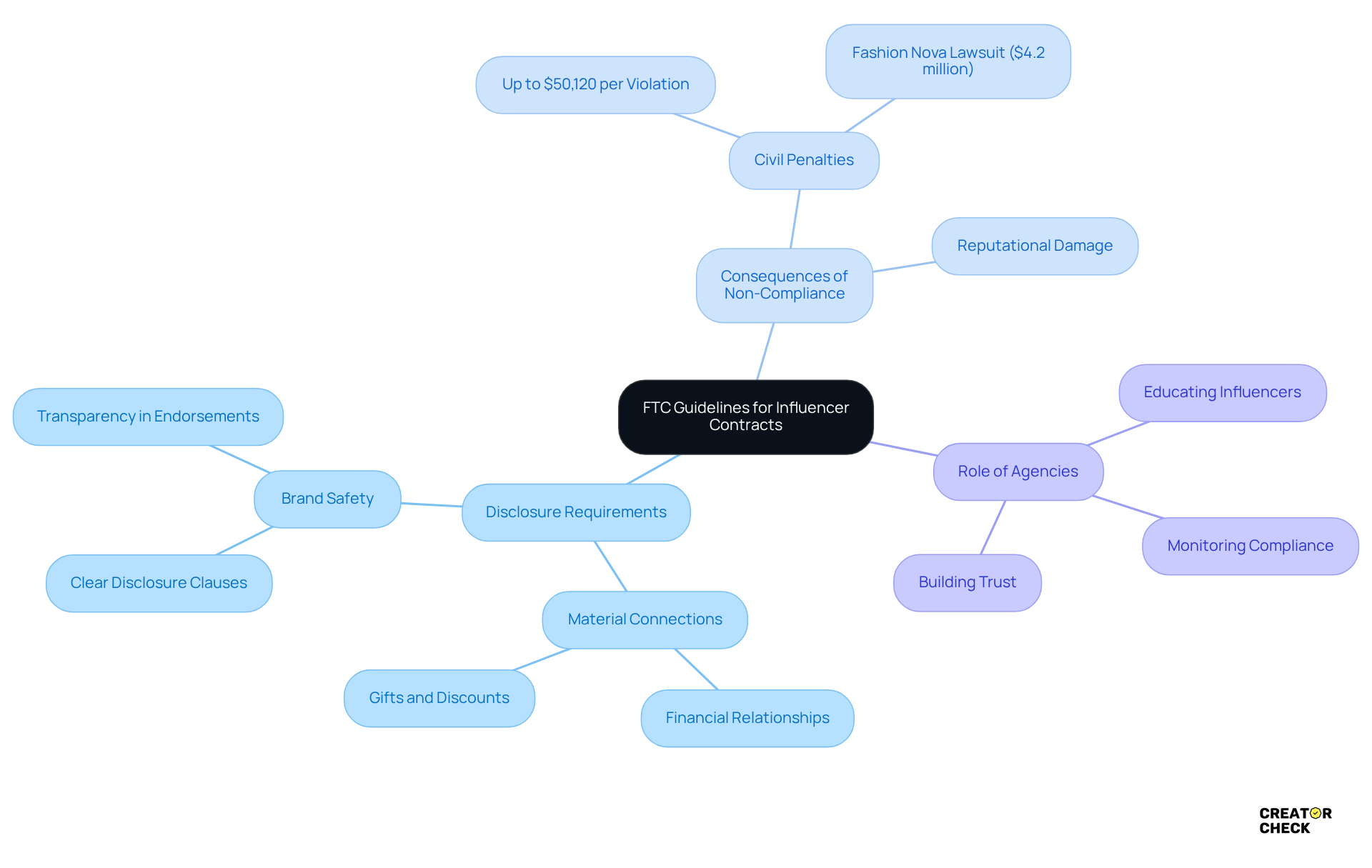
Clear Content Deliverables: A Must for Brand Safety
Contracts should clearly spell out what kind of content you expect from influencers, including specifics like videos and posts, plus any deadlines, while ensuring compliance with brand safety requirements in influencer contracts. This clarity is super important—not just for setting expectations, but also for maintaining your company's reputation by adhering to brand safety requirements in influencer contracts. It helps ensure that what the creators produce aligns with your values. Regular check-ins and updates on what’s due can really boost accountability and quality control, making for a more productive partnership.
So, what does this mean for you? In 2025, the best practices will be all about setting these clear content expectations. Companies are realizing that having well-defined agreements leads to higher-quality outputs and better integrity. Experts suggest that keeping open lines of communication about content expectations, including brand safety requirements in influencer contracts, can help lower the risks tied to marketing collaborations, ultimately strengthening your reputation in a competitive landscape. Remember, a little clarity goes a long way!
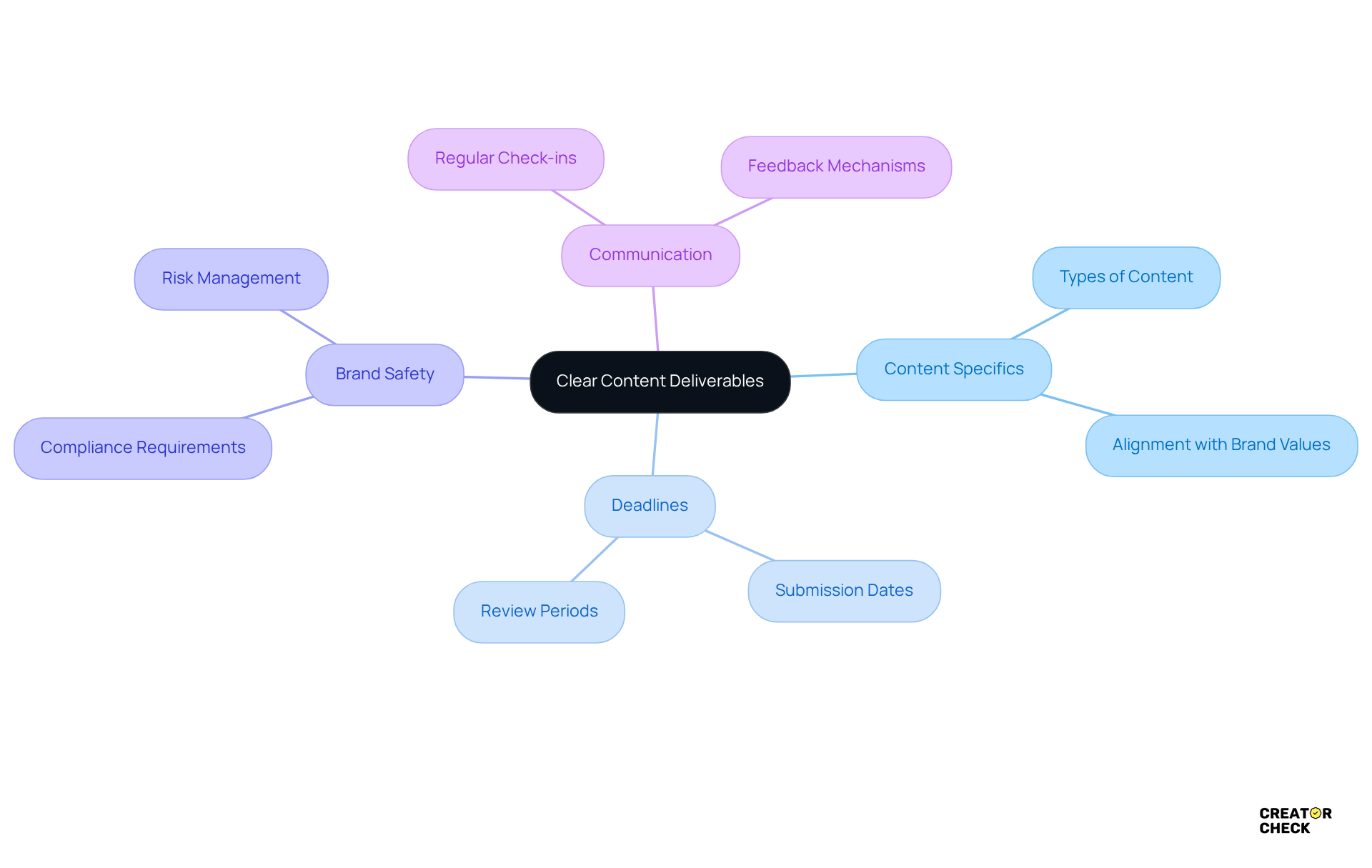
Exclusivity Clauses: Safeguarding Brand Integrity
Exclusivity provisions are super important in ambassador agreements. They keep ambassadors from endorsing rival products while the contract is active. This kind of protection is key for maintaining a company's unique selling proposition (USP) and making sure that the promoter's audience vibes with the company's messaging. Take Wild One, for instance; they’ve nailed long-term collaborations with creators, building trust and relatability while keeping their products front and center.
Agencies really need to think about how long and how wide the exclusivity should be. It’s all about finding that sweet spot between what the individual wants and what the company needs. With the marketing sector projected to hit $33 billion by 2025, the importance of these agreements is only going to grow. Brands that focus on exclusivity can boost their credibility and deepen audience engagement, which often leads to a better ROI.
And here’s something to think about: 95% of content creators have turned down partnership offers because the payment wasn’t right or the alignment was off. So, offering fair compensation and a bit of creative freedom in exclusivity agreements can really pave the way for high-quality collaborations. By protecting product integrity with well-structured exclusivity agreements, agencies can foster stronger partnerships that benefit both the company and the promoter.
So, how can you leverage exclusivity in your own collaborations?
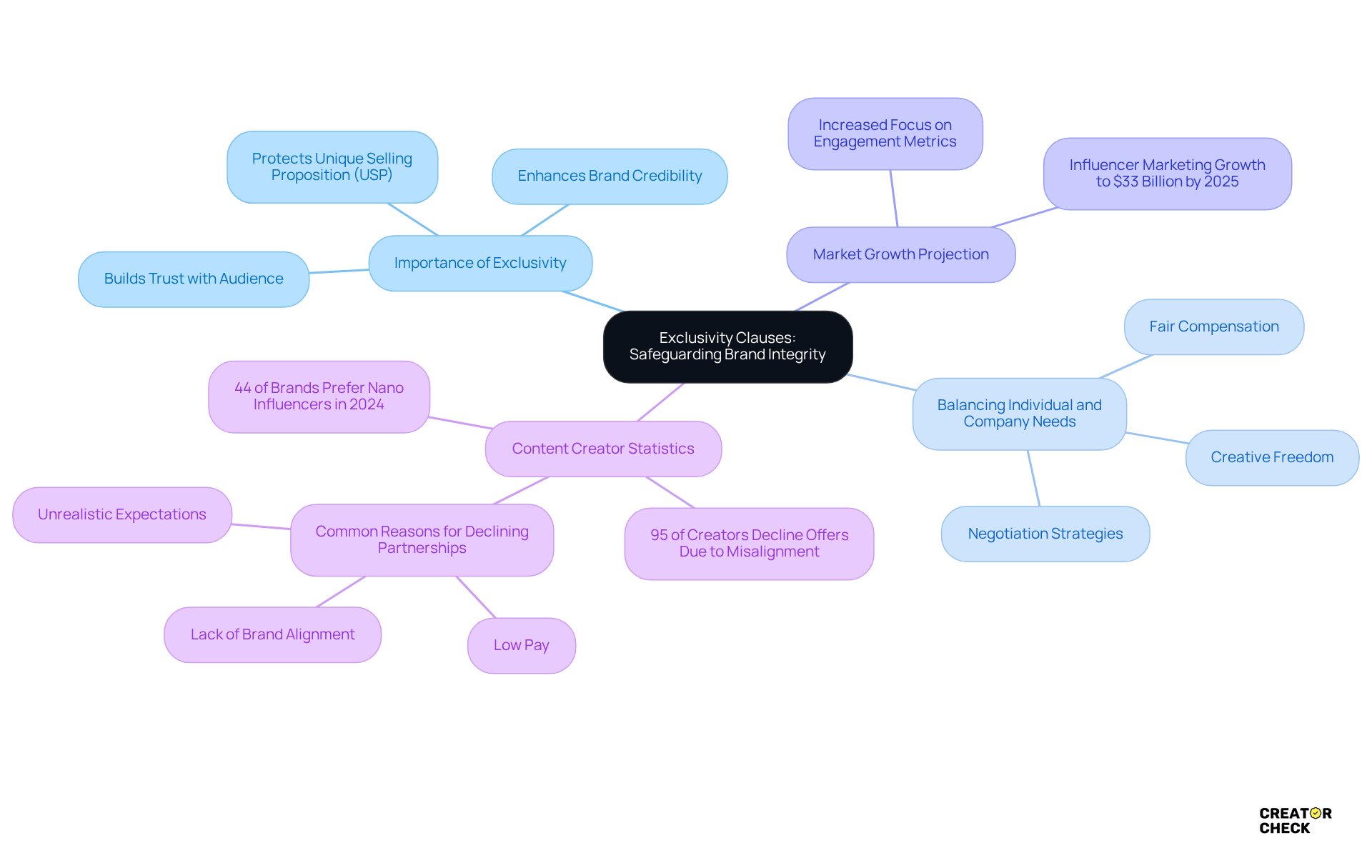
Intellectual Property Rights: Protecting Brand Assets
Agreements should clearly spell out who owns the material created by creators. Are the company's rights exclusive, or can the creator reuse the content? This clarity is crucial to avoid disputes over how content is used and to protect the organization's intellectual property. For example, recent disputes have shown just how important clear agreements are. Misunderstandings can lead to costly legal battles. Take, for instance, the case of an influencer who faced legal action after repurposing content without the right authorization—this led to some hefty financial repercussions.
So, what does this mean for you? Agencies should really focus on teaching key individuals about the importance of intellectual property rights. It’s essential for them to understand how to respect and protect business assets. This kind of education helps create a collaborative environment, making partnerships more effective and long-lasting.
Plus, well-negotiated exclusivity provisions can pave the way for ongoing collaborations while still allowing individuals the flexibility to work with non-competing companies. This really highlights why precise definitions in agreements matter so much!
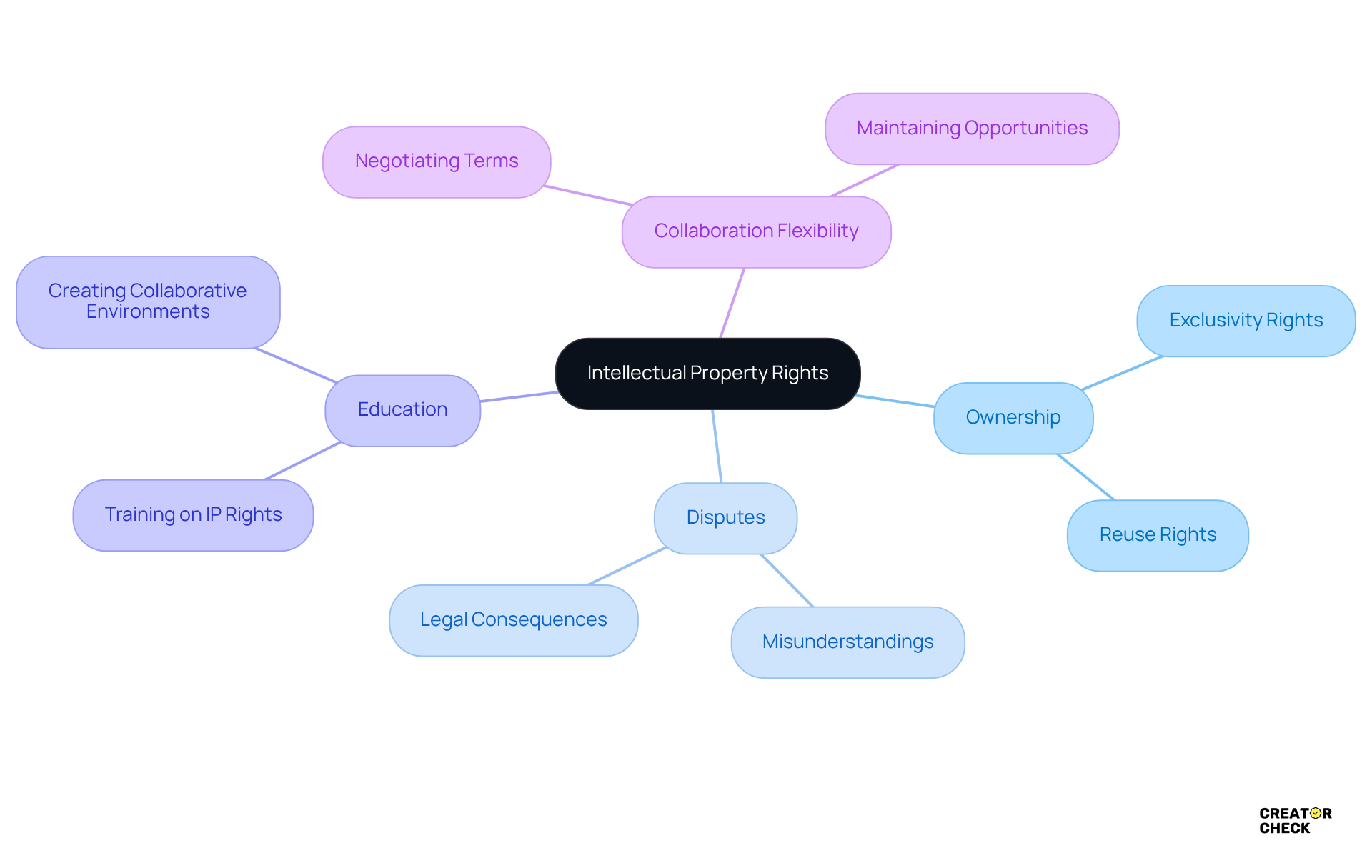
Data Privacy Regulations: Ensuring Consumer Trust
Hey there! When it comes to influencer contracts, it’s super important to discuss brand safety requirements in influencer contracts along with data privacy regulations like the General Data Protection Regulation (GDPR) and the California Consumer Privacy Act (CCPA). Companies really need to make sure that promoters are handling consumer data responsibly and transparently. This means getting clear consent for data collection and letting folks know how their information will be used. By putting data privacy first, companies not only stay on the right side of the law but also build trust with their audience, which is crucial in today’s digital world.
So, what happens if companies don’t comply? Well, they could face some hefty penalties—fines can soar up to €20 million or 4% of global revenue! That’s why it’s essential for influencers to stick to these regulations. Plus, organizations might need to bring on a Data Protection Officer to keep an eye on compliance efforts.
Keeping thorough documentation of how data is collected and used is key for staying compliant and minimizing risks. And don’t forget about staff training—implementing organizational measures is just as important. Ultimately, being dedicated to data privacy not only boosts a company’s reputation but also lowers potential legal risks. When working with social media personalities, addressing brand safety requirements in influencer contracts is truly a cornerstone of effective marketing strategies. So, let’s make sure we’re all on the same page about this important topic!
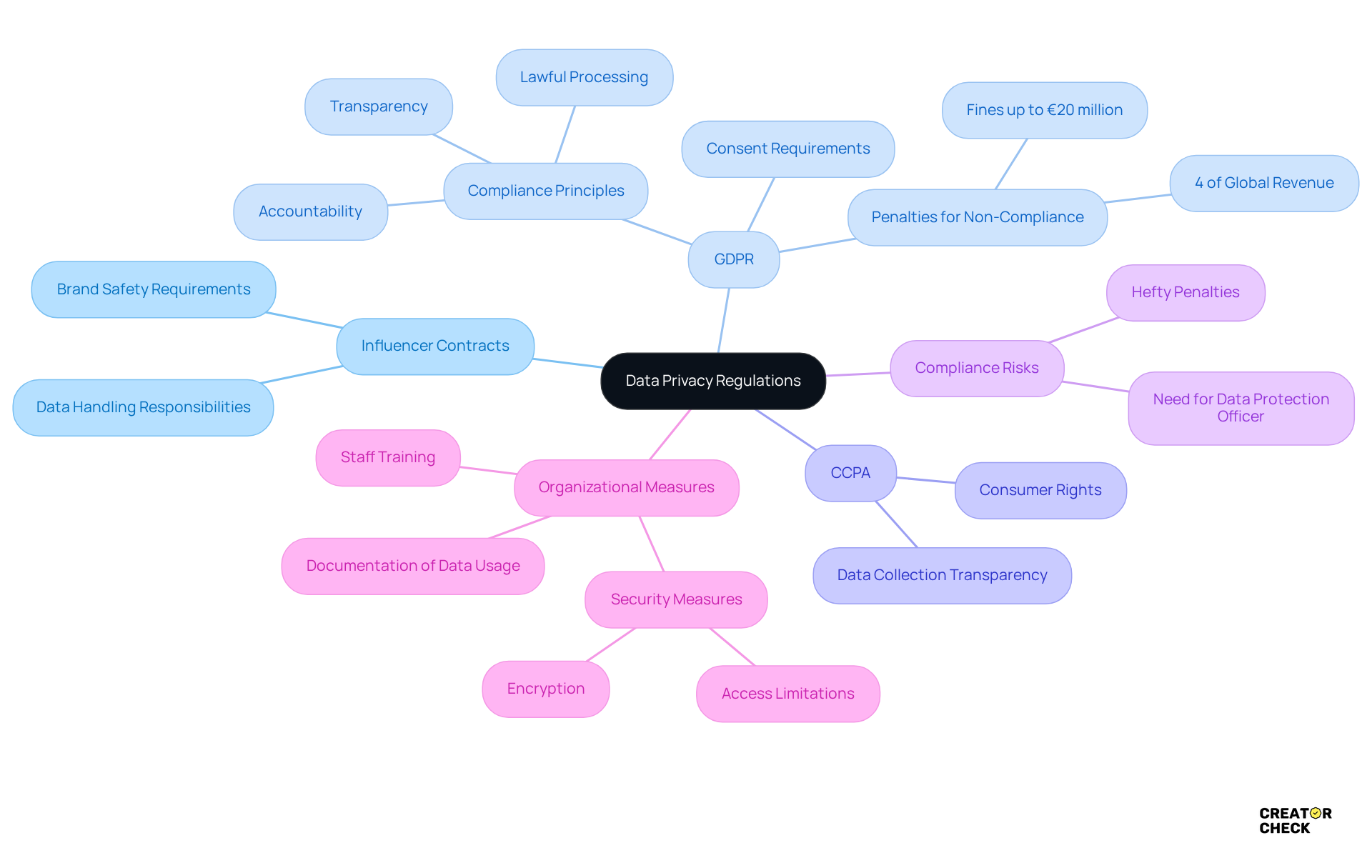
Monitoring and Compliance: Upholding Brand Safety
Agencies really need to establish strong monitoring systems to ensure that content creators comply with the brand safety requirements in influencer contracts. This means taking a good look at posts to check that they follow company guidelines and FTC regulations. Regular audits are a must! They help spot any compliance issues early on, which lets agencies tackle them before they become bigger problems. According to the FTC, an act or practice is considered deceptive if it misleads 'a significant minority' of consumers. So, it’s super important to have clear disclosures in every ad.
Keeping oversight not only protects a company's reputation but also ensures that collaborations with promoters align with the organization's core values. Best practices for tracking compliance include:
- Using automated systems that flag any non-compliant content
- Maintaining clear communication channels about brand safety requirements in influencer contracts, so influencers know what's expected of them
As the influencer marketing landscape evolves, agencies should really prioritize these strategies to maintain safety and foster successful partnerships. So, what does this mean for you? It’s all about staying proactive and ensuring that your collaborations are as effective and trustworthy as possible!

Dispute Resolution Mechanisms: Protecting Brand Reputation
When it comes to contracts, it’s super important to include clear dispute resolution mechanisms—think mediation or arbitration—to handle any conflicts that might pop up during a partnership. By laying these processes out from the get-go, agencies can really cut down on the chances of public disputes that could hurt their reputation. Plus, having a structured way to resolve conflicts helps create a more cooperative vibe and encourages open dialogue between companies and content creators.
So, what does this mean for you? It means a smoother partnership and a better chance of keeping things friendly!
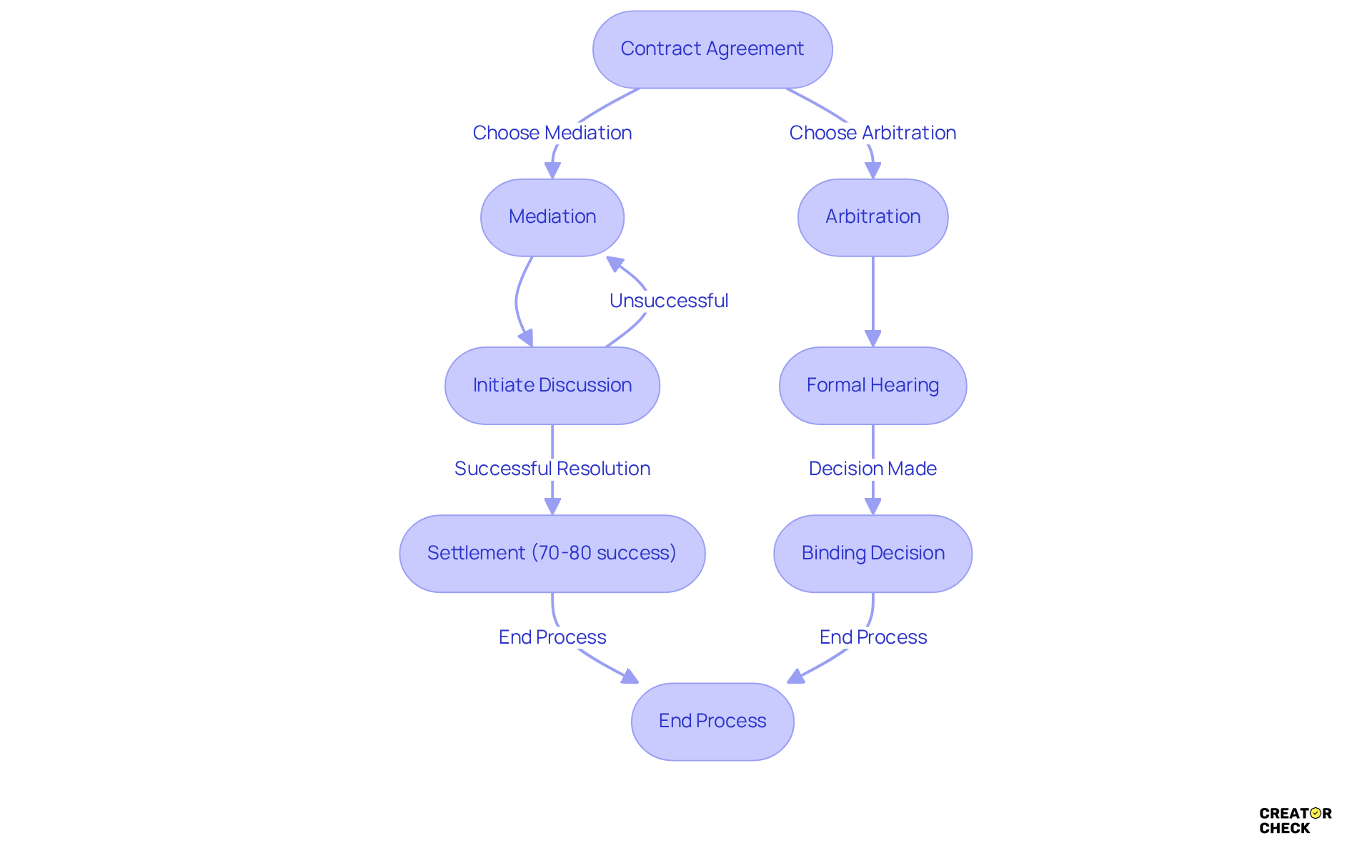
Transparency and Disclosure: Key to Brand Safety
Influencer agreements need to clearly state that sponsored content must be disclosed, ensuring individuals share their connections with companies transparently. This means using the right hashtags like #ad or #sponsored, which help consumers better understand endorsements. Did you know that research shows effective disclosure practices can really boost audience trust? Consumers are getting better at spotting inauthentic endorsements, so it’s crucial to prioritize transparency. By doing this, companies not only follow FTC guidelines—which say influencers must disclose any material connection to an organization—but also build their credibility and foster trust with their audience.
Clear communication is key here. Industry experts emphasize that disclosures should be easy to spot and prominent, so consumers know exactly what kind of content they’re engaging with. This commitment to clarity doesn’t just improve brand safety requirements in influencer contracts; it also enhances the integrity of marketing by individuals. So, what does this mean for you? It’s all about being open and honest, which ultimately pays off in the long run!
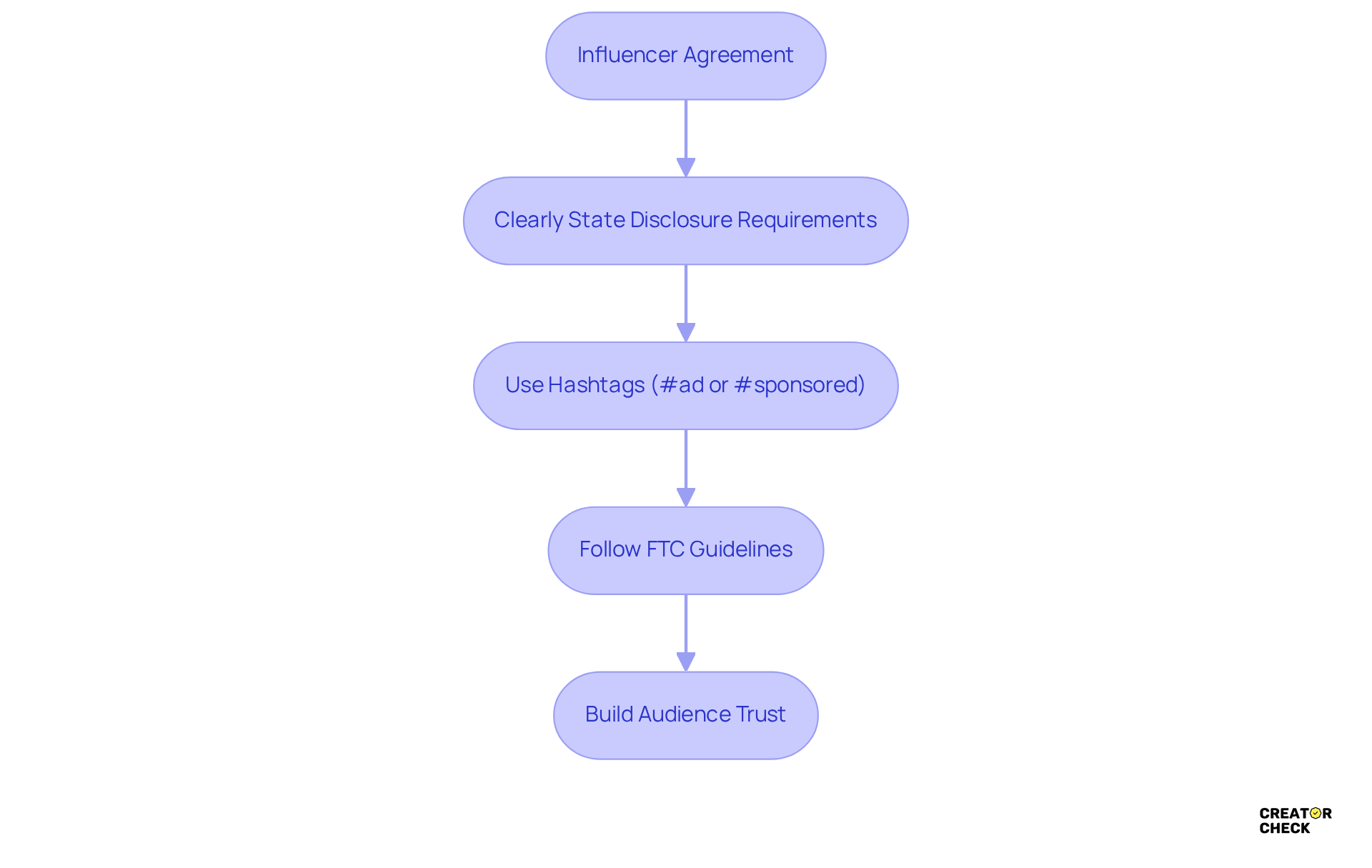
Regular Contract Reviews: Adapting to Compliance Changes
Agencies really need to get systematic when it comes to evaluating agreements with social media personalities to ensure compliance with brand safety requirements in influencer contracts. It’s all about making sure they’re in line with the latest regulations and industry standards. Staying updated on evolving FTC guidelines, data privacy laws, and other important regulations is key. By proactively revising agreements, agencies can cut down on risks tied to non-compliance and build solid, compliant partnerships with influencers.
So, what does this mean for you? Well, recent trends show that agencies are increasingly tweaking their agreements to reflect these compliance changes. This highlights just how crucial it is to regularly evaluate your contracts to ensure compliance with brand safety requirements in influencer contracts and maintain legal and ethical integrity in influencer marketing. For instance, a notable case study from last year highlighted how one agency revamped its agreements to include clear disclosure requirements for influencers regarding financial relationships. This not only improved compliance but also boosted transparency.
To effectively implement regular contract reviews, agencies should think about scheduling quarterly assessments. A handy checklist that includes current regulations and best practices can really help streamline this process. Let’s dive into how these steps can benefit your agency and ensure you’re on the right track!
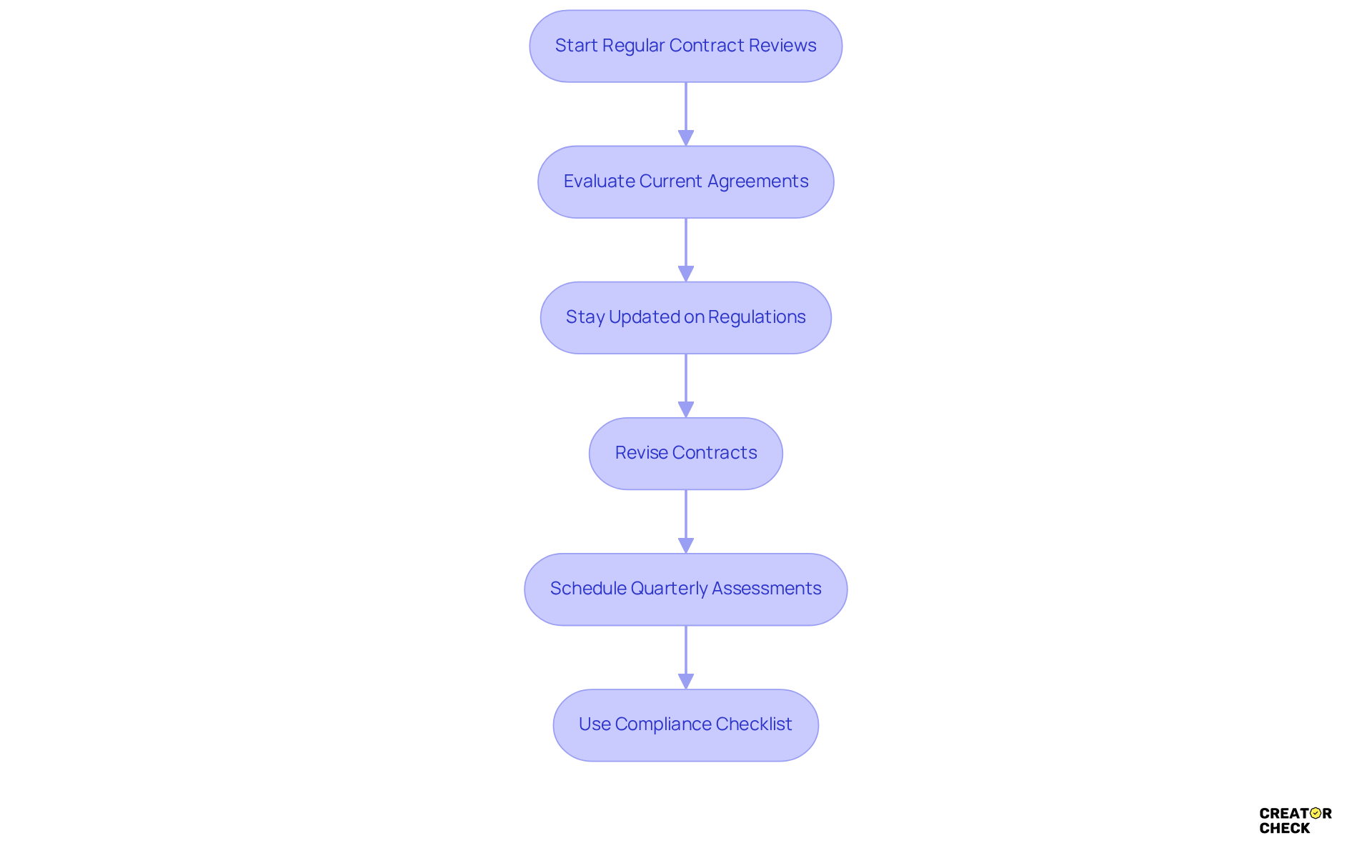
Conclusion
Establishing brand safety requirements in influencer contracts is super important for building successful and trustworthy partnerships. By focusing on compliance with regulations like FTC guidelines and including clear content deliverables, agencies can protect their brand integrity while boosting the effectiveness of their marketing strategies. The insights shared throughout this article really highlight the value of having a structured approach to influencer contracts, making sure everyone is on the same page.
Key points emphasize the need for:
- Transparency
- Exclusivity clauses
- Intellectual property rights to protect both brands and influencers
Plus, integrating AI management tools can make contract processes smoother, allowing agencies to concentrate on strategic growth while keeping everything compliant. Regular contract reviews and solid monitoring systems are essential for adapting to changing regulations and ensuring that all marketing efforts are ethical and effective.
So, what does this mean for you? The influencer marketing landscape is shifting quickly, and staying ahead of the game is crucial. By embracing best practices and encouraging open communication, agencies can not only reduce risks but also forge lasting relationships with influencers that truly resonate with audiences. Prioritizing brand safety in influencer contracts isn’t just a legal must; it’s a strategic edge that can lead to greater trust, authenticity, and ultimately, success in the competitive marketing world.
Frequently Asked Questions
What is Creator Check and how does it benefit content creators?
Creator Check is an AI-powered management tool designed to streamline contract management for content creators. It features an AI-powered inbox that organizes communication, automatically tags and prioritizes emails, and includes a Brand Manual feature to maintain consistent messaging across campaigns. This automation saves time and enhances the negotiation process, allowing agencies to secure more lucrative deals for creators.
How much does Creator Check cost?
Creator Check has a subscription fee of $25 per month for each inbox.
What are the FTC guidelines regarding influencer contracts?
The FTC requires social media influencers to disclose any material connections with brands, such as payments or free products. Contracts must clearly outline brand safety requirements to ensure compliance, as failure to adhere can result in civil fines of up to $50,120 per violation.
What are the consequences of not following FTC regulations?
Not following FTC regulations can lead to significant penalties, including civil fines. For instance, Fashion Nova faced a $4.2 million lawsuit for not disclosing negative user reviews, highlighting the serious repercussions of non-compliance.
What role do agencies play in ensuring compliance with FTC guidelines?
Agencies help influencers understand FTC regulations by including clear disclosure clauses in contracts. This promotes transparency and builds trust with content creators and their audiences, ultimately supporting compliance with brand safety requirements.
Why is it important to have clear content deliverables in influencer contracts?
Clear content deliverables specify what is expected from influencers, including types of content and deadlines. This clarity helps maintain a company's reputation, aligns produced content with brand values, and fosters accountability and quality control in partnerships.
What are best practices for influencer contracts in 2025?
Best practices will focus on setting clear content expectations, maintaining open communication about these expectations, and ensuring compliance with brand safety requirements. This approach leads to higher quality outputs and strengthens a company's reputation in a competitive market.


